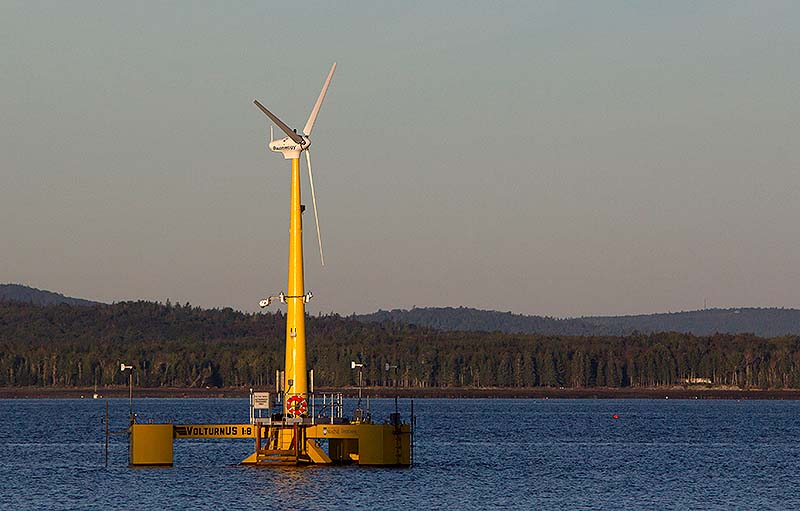AUGUSTA — Before its public push to have Maine reconsider wind energy proposals, Gov. Paul LePage’s administration worked behind the scenes to explicitly derail Norwegian company Statoil’s multimillion-dollar agreement with the state for an offshore wind project, according to documents obtained by The Associated Press.
The first public word that the administration was trying to reopen bids for the wind energy project came in June. Yet before that, officials went a step further and sought to void Norwegian company’s agreement in order to “stop the Statoil project,” the governor’s top energy official, Patrick Woodcock, wrote in a May email.
Administration officials had said publicly that they wanted to reopen bidding to allow the University of Maine to get into the action. LePage signed legislation to do so in June, prompting Statoil to put the project on hold and consider other locations for its $120 million project.
But, according to a memo Woodcock wrote that month, the administration had initially floated “a much more aggressive effort to explicitly void” Statoil’s agreement. In effect, the state would limit the amount that home and business owners would pay for the project to about half of what Statoil had proposed.
The AP reviewed hundreds of emails and documents related to Statoil’s project obtained through the Freedom of Access Act from the governor’s office, the Public Utilities Commission, and the University of Maine system. The documents provide a glimpse into negotiations over the wind project among administration officials, lawmakers, lawyers and other stakeholders.
The administration’s maneuvering to scuttle an agreement between state regulators and Statoil set a dangerous precedent and calls into question the Republican administration’s interest in cultivating an offshore wind industry, lawmakers and industry officials have said.
“The message that was sent was that you can’t depend on the state of Maine to keep their commitments,” said Jack Cashman, former chairman of the utilities commission, of the state’s reopening of the bidding process.
Statoil, one of the world’s largest energy companies and the first to deploy an offshore wind turbine four years ago, won approval in January to put four wind turbines 12 miles off Boothbay Harbor on floating structures tethered to the seabed. The spinning blades would generate electricity to be sent to Maine homes and businesses.
Maine leads New England in wind power and state officials had expressed hope that Statoil’s project would help the state become even more prominent in offshore projects, the prospect of which has been subject to a lot of talk but little action in the U.S.
At the time, renewable energy industry officials praised the project’s approval, saying it would create jobs and provide an opportunity for other companies to work with Statoil.
By contrast, LePage opposed the project because utility customers would be on the hook for nearly $200 million in subsidies.
Enter the University of Maine.
The school is competing with Statoil for a $50 million federal energy grant and feared that the awarding the wind project to the Norwegian company might put the university at a disadvantage to win the money.
If UMaine were to bid for and win the wind project, it would be better positioned to get the grant, and LePage’s administration could keep the wind project’s money in Maine.
In an interview, Woodcock said that initial effort to derail Statoil’s proposal also would have provided an opportunity for the university to submit a bid while allowing Statoil to redo its own.
But questions arose about why UMaine would even want to compete for the project because of concerns about its ability to match Statoil’s expertise and background in wind energy. University officials say they have teamed up with strong companies and are capable of advancing their project.
The reopening of the bidding process calls into question whether LePage wanted to scuttle the efforts by both Statoil and UMaine in an effort to stymie offshore wind projects altogether, said Jeremy Payne, executive director of the Maine Renewable Energy Association.
Woodcock defended the administration’s efforts, saying the “exceptional circumstances” required it to take action to help the university.
“It really was a unique situation and I think this competition will allow us to have a healthy debate about the direction of Maine’s offshore wind industry,” Woodcock said.
But Cashman said the administration’s meddling in the work of state regulators, who are authorized by law to approve an offshore wind pilot project, sets a treacherous example for future dealings between the state and the private sector.
“That is an absolutely horrible precedent and it is an even more horrible message that we have sent to the business community internationally,” said Cashman, who was appointed under Democratic Gov. John Baldacci after he served as commissioner for the state’s economic development agency.
Thomas Welch, the utility commission’s current chairman, said he did not find legislation that affects the commission’s work to be a concern.
“The Legislature actually creates the (commission) and can tell us what to do, so I don’t have an opinion on that,” he said.
The university submitted its proposal this month, but it remains confidential, as is allowed under the utilities commission’s procedures. State regulators are expected to decide on the two proposals by the end of the year.
Statoil officials say the company is now looking to other countries, like Scotland, as possible site locations, but has not yet ruled out Maine as home for its project.
But the documents show that, at the time, Statoil officials saw the renewed bidding process as a poison pill.
In a June email to a leader of UMaine’s project, a Statoil lawyer wrote:
“I’m reasonably sure you already know this, but I want to be absolutely certain you hear it from me. If the … amendment is adopted, Statoil will have no choice but to take its investment elsewhere.”
Send questions/comments to the editors.


